-
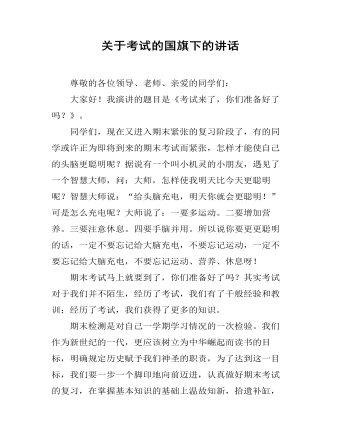
关于考试的国旗下的讲话
尊敬的各位领导、老师、亲爱的同学们:大家好!我演讲的题目是《考试来了,你们准备好了吗?》。同学们,现在又进入期末紧张的复习阶段了,有的同学或许正为即将到来的期末考试而紧张,怎样才能使自己的头脑更聪明呢?据说有一个叫小机灵的小朋友,遇见了一个智慧大师,问:大师,怎样使我明天比今天更聪明呢?智慧大师说:“给头脑充电,明天你就会更聪明!”可是怎么充电呢?大师说了:一要多运动。二要增加营养。三要注意休息。四要手脑并用。所以说你要更更聪明的话,一定不要忘记给大脑充电,不要忘记运动,一定不要忘记给大脑充电,不要忘记运动、营养、休息呀!期末考试马上就要到了,你们准备好了吗?其实考试对于我们并不陌生,经历了考试,我们有了千般经验和教训;经历了考试,我们获得了更多的知识。期末检测是对自己一学期学习情况的一次检验。我们作为新世纪的一代,更应该树立为中华崛起而读书的目标,明确规定历史赋予我们神圣的职责,为了达到这一目标,我们要一步一个脚印地向前迈进,认真做好期末考试的复习,在掌握基本知识的基础上温故知新,拾遗补缸,注意复习注意方法,提高学习效率,争取取得优秀成绩。
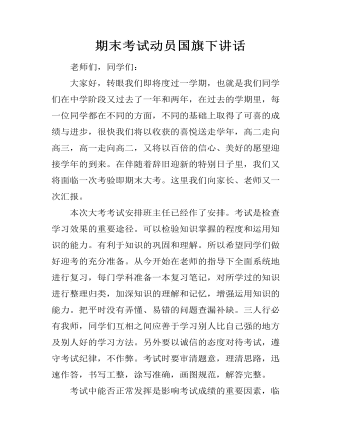
期末考试动员国旗下讲话
老师们,同学们:大家好,转眼我们即将度过一学期,也就是我们同学们在中学阶段又过去了一年和两年,在过去的学期里,每一位同学都在不同的方面,不同的基础上取得了可喜的成绩与进步,很快我们将以收获的喜悦送走学年,高二走向高三,高一走向高二,又将以百倍的信心、美好的愿望迎接学年的到来。在伴随着辞旧迎新的特别日子里,我们又将面临一次考验即期末大考。这里我们向家长、老师又一次汇报。本次大考考试安排班主任已经作了安排。考试是检查学习效果的重要途径。可以检验知识掌握的程度和运用知识的能力。有利于知识的巩固和理解。所以希望同学们做好迎考的充分准备。从今开始在老师的指导下全面系统地进行复习,每门学科准备一本复习笔记,对所学过的知识进行整理归类,加深知识的理解和记忆,增强运用知识的能力。
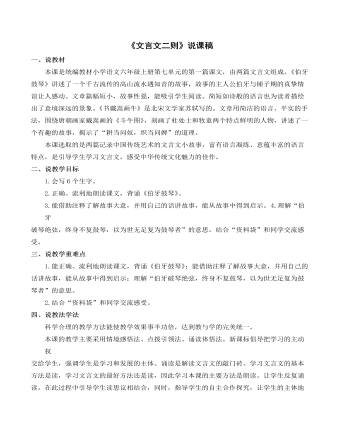
部编人教版六年级上册《文言文二则》说课稿
三、说教学重难点1.能正确、流利地朗读课文,背诵《伯牙鼓琴》;能借助注释了解故事大意,并用自己的话讲故事,能从故事中得到启示;理解“伯牙破琴绝弦,终身不复鼓琴,以为世无足复为鼓琴者”的意思。2.结合“资料袋”和同学交流感受。四、说教法学法 科学合理的教学方法能使教学效果事半功倍,达到教与学的完美统一。 本课的教学主要采用情境感悟法、点拨引领法、诵读体悟法。新课标倡导把学习的主动权交给学生,强调学生是学习和发展的主体。诵读是解读文言文的敲门砖。学习文言文的基本方法是读,学习文言文的最好方法还是读,因此学习本课的主要方法是朗读。让学生反复诵读,在此过程中引导学生读思议相结合,同时,指导学生的自主合作探究,让学生的主体地位体现在从提出问题到探究问题,解决问题的过程中。
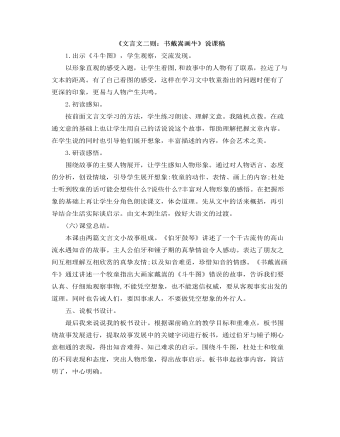
部编人教版六年级上册《文言文二则:书戴嵩画牛》 说课稿
1.出示《斗牛图》,学生观察,交流发现。以形象直观的感受入题,让学生看图,和故事中的人物有了联系,拉近了与文本的距离。有了自己看图的感受,这样在学习文中牧童指出的问题时便有了更深的印象,更易与人物产生共鸣。2.初读感知。按前面文言文学习的方法,学生练习朗读、理解文意。我随机点拨。在疏通文意的基础上也让学生用自己的话说说这个故事,帮助理解把握文章内容。在学生说的同时也引导他们展开想象,丰富描述的内容,体会艺术之美。3.研读感悟。围绕故事的主要人物展开,让学生感知人物形象。通过对人物语言、态度的分析,创设情境,引导学生展开想象:牧童的动作、表情、画上的内容;杜处士听到牧童的话可能会想些什么?
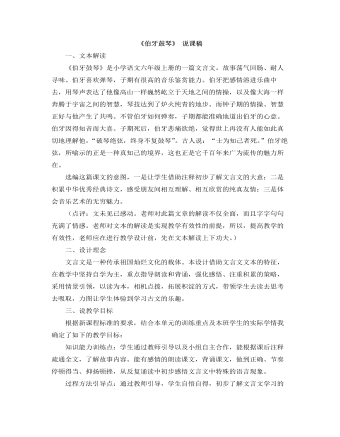
部编人教版六年级上册《文言文二则:伯牙鼓琴》 说课稿
一、文本解读《伯牙鼓琴》是小学语文六年级上册的一篇文言文。故事荡气回肠、耐人寻味。伯牙喜欢弹琴,子期有很高的音乐鉴赏能力。伯牙把感情溶进乐曲中去,用琴声表达了他像高山一样巍然屹立于天地之间的情操,以及像大海一样奔腾于宇宙之间的智慧,琴技达到了炉火纯青的地步。而钟子期的情操、智慧正好与他产生了共鸣。不管伯牙如何弹奏,子期都能准确地道出伯牙的心意。伯牙因得知音而大喜。子期死后,伯牙悲痛欲绝,觉得世上再没有人能如此真切地理解他,“破琴绝弦,终身不复鼓琴”。古人说:“士为知己者死。”伯牙绝弦,所喻示的正是一种真知己的境界,这也正是它千百年来广为流传的魅力所在。选编这篇课文的意图,一是让学生借助注释初步了解文言文的大意;二是积累中华优秀经典诗文,感受朋友间相互理解、相互欣赏的纯真友情;三是体会音乐艺术的无穷魅力。
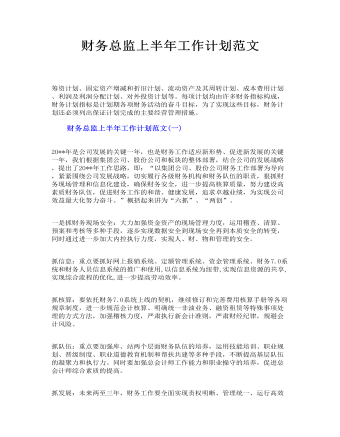
财务总监上半年工作计划范文
一是抓财务现场安全:大力加强资金资产的现场管理力度,运用稽查、清算、预案和考核等多种手段,逐步实现数据安全到现场安全再到本质安全的转变,同时通过进一步加大内控执行力度,实现人、财、物和管理的安全。 抓信息:重点要抓好网上报销系统、定额管理系统、资金管理系统、财务7.0系统和财务人员信息系统的推广和使用,以信息系统为纽带,实现信息资源的共享,实现综合流程的优化,进一步提高劳动效率。
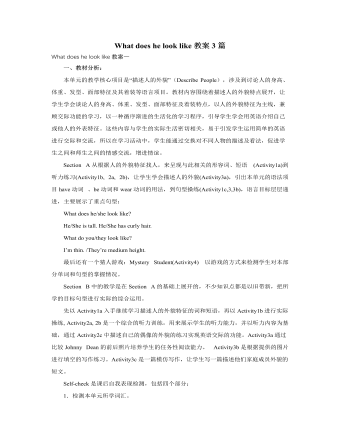
人教版新目标初中英语七年级下册What does he look like教案3篇
所需要用到的句子:Who is that?That is Jack. I like him.Why do you like him?I like him because he is interesting.Task 4: 设计理想中的人类Step one: 设计理想中的人类的外貌。把全班同学分成若干小组,学生可以边说边在纸上画出他们的模样。Step two: 设计理想中人类的性格。学生们可以把那些能描述性格的单词写在图画的旁边。Step three: 每组选出一名同学,其他同组同学提问,他作简单回答,并说明原因。所需用到的句子:What does he or she look like?He or she ...What is he or she like?He or she is ...Why?Because ...Task 5: 挑战性活动调查性格是天生的还是后天形成的,让每个同学回家去调查一下自己成长过程中性格是否有变化,具体是怎样的,为什么会这样? Teaching Aims:1. Enable students to have a general understanding of how to talk about people's physical appearance.2. Enable students to tackle some essential vocabularies and patterns about describing people. Provide them with necessary skills and methods.3. Create various chances for students to describe the persons they're familiar with, such as classmates, family members, teachers, idols, etc.
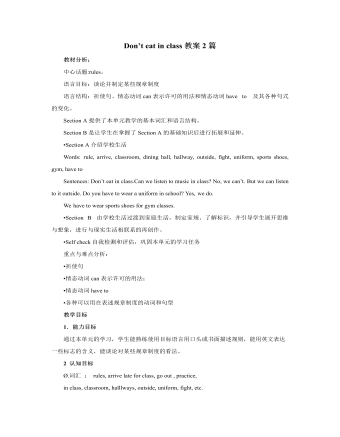
人教版新目标初中英语七年级下册Don’t eat in class教案2篇
Don’t fight. =You can’t fight. (板书,教读)教师把这些句子板书在黑板上,并请学生大声整齐地读祈使句和“can’t”句型,并让学生注意两种句型表达形式的不同和转换,“Don’t …=You can’t…”;并对学生说:These are our school rules. (板书,教读) You can’t break the school rules. Don’t break the school rules.(板书,教读)步骤3 :Practicea. T: Now, each of the students is breaking one of these rules.Please finish 1a.学生看图,完成1a的内容,检查答案并大声朗读校规。b. 听录音,完成1b,选出四位学生都违反了哪条校规;听之前,学生要读会英文名。c. 请两位学生朗读1c部分的句型;要求学生两人一组对话表演,SA扮演外校转来新生,SB告知本校校规。(学生可经过讨论,多说出他们想到的校规,不必只限于书上;教师应给予帮助)2) 第二课时(2a~4)步骤1 :warming up of revisionT: What are the rules at your school?学生使用“can”或祈使句表达各条校规;其中老师可引出“eat in the cafeteria outside”的表达。步骤2 :Practicea.T: Christina is an exchange student. She doesn’t know the rules. Let’s listen, what activities they’re talking about?学生听第一遍时,完成2a;第二遍时,完成2b;b. 请学生领读2c部分,看着2a完成的表格,理解2c活动的要求;分成小组针对2a进行问答;
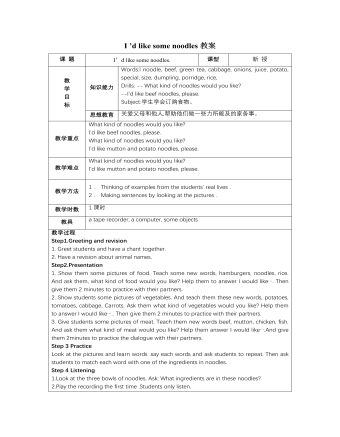
人教版新目标初中英语七年级下册I ’d like some noodles教案
教学过程Step 1: warming-up Sing a song---------“food and drink” Step 2: Revision1 Dictation2 Revise: What kind of noodles would you like?I’d like …What size bowl of noodles would you like?I’d like…Step 3: Presentation1 show pictures of food, ask students say the words.2 Students read the newspaper ad in 3a. Fill in blanks with words in the box. Then read the ad together, the teacher explains some difficult language points.3 Check the answers Step 4 PracticeAsk students to finish 3b in the same way according to 3a. Students read the short passage and fill in the blanks .At last, check the answers.Step 5 productionAsk students to write their own ad for dumplings, noodles, drinks, and other foods they know. Then ask students to read their partner’s ad. Then order food and drink from their partner.Step 6 Home workGroup work – make an ad about “food and drink”
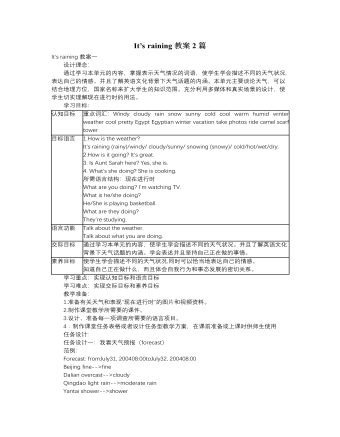
人教版新目标初中英语七年级下册It’s raining教案2篇
1 Each group choose one place to describe and what you are doing in it Choose one place, and describe what they are doing 2 Move around the room and give suggestions Talk about it and write it down 3 Ask one to show their works and act it Choose one of each group to make a report 4 Evaluate the best group and the best reporter Choose the best one Homework Ask your friends their ideal place and write about it教学反思:新课程标准中强调学生在课堂中的主体地位,在综合课中他们的主体地位就更加突出。在各个活动中给不同程度的学生不同层次的任务,让各层面的学生都有表现发挥的机会,从而产生对英语的兴趣。使用照片图片多媒体来辅助教学,效果更好。同时让了解其他国家风景,风俗的同学介绍ideal place,增加学生的背景知知识,实现跨学科交流的目的。教案点评:采用任务型教学模式,在各个活动中给不同程度的学生不同层次的任务,让各层面的学生都有表现发挥的机会,从而产生对英语的兴趣。使用照片图片多媒体来辅助教学,效果更好。让了解其他国家风景,风俗的同学介绍ideal place,增加学生的背景知识,实现跨学科交流的目的。
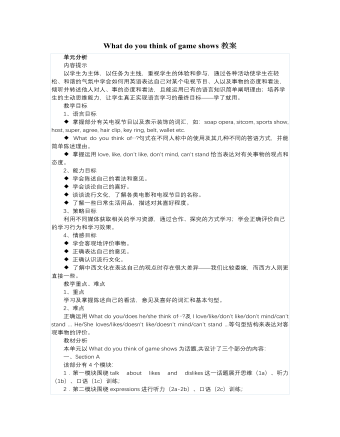
人教版新目标初中英语七年级下册What do you think of game shows教案
五、教学Section B-2c1. Pair work: What do you think of the belt/sunglasses/…? What does your father/mother/… think of your scarf/belt…?2. Group work(1). Teacher shows some different kinds of school uniforms (制服)and asks : “ What do you think of your school uniforms? If you have a chance to choose your school uniforms, what kind would you like to choose?”(2). Discuss in groups.(3).Get some Ss to report in class.说明:这一步旨在让学生运用已有的语言知识谈论对事物的看法和意见,并简单阐明理由,培养学生的主动思维能力和运用英语的能力。六、教学拓展调查电视节目的收视率任务:调查你周围的人对现在各种电视节目的反响。活动过程:1.教师布置任务,让学生调查周围的人(包括他的亲戚朋友和邻居)喜欢收看哪方面的电视节目。2.学生进行调查活动,运用本单元所学的句型What do you think of….? (Why?)What's your favorite game shows?What do you think of talk show?I doesn’t mind it.I like it.I love it.I can’t stand it.3.记录下排在前10位的TV Program,填写调查表,比较其收视率。
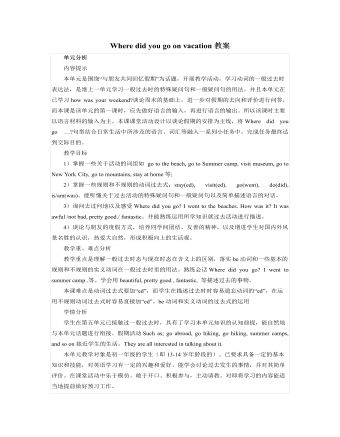
人教版新目标初中英语七年级下册Where did you go on vacation教案
句型: Where did you go on vacation? I went to summer camp.Did she go to Central Park?Yes,she did.No, she didn’t语法:一般过去时特殊疑问句、一般疑问句及肯、否定回答。课时安排4课时第一课时:Section A:la,1b,lc,2a,2b,2c 第二课时:Section A:3a,3b,4第三课时:Section B:1,2a,2b,2c第四课时:Section B:3a,3b,3c,4 and Self Check第一课时教学目标掌握描写假期生活的形容词。假期里自己所做事情的简单表达。谈论假期做的事情及当时情况。谈论假期时旅游的天气,旅游者以及食物等。教学过程一、导入播放一首英文歌曲:Let’s travel 说明:通过让学生听节奏欢快迪斯尼英语歌曲Let’s travel.引入本节课谈论的话题vacation and travel. 让歌曲使学生的思维活跃,增强课堂气氛,激发学生提高学习英语的兴趣。T:How is the trip ?Ss : It’s pretty good/ happy/exciting /relaxing/busy/dangerous/ fantastic说明:这个问题是为了操练形容词。建议让多个Ss作答。鼓励他们用不同的形容词。上述个别形容词本应在第二课时中出现,但可以在warming-up中第一次非正式出现。这些形容词也可在老师的评价语中适时出现,以加深学生对词汇的印象。
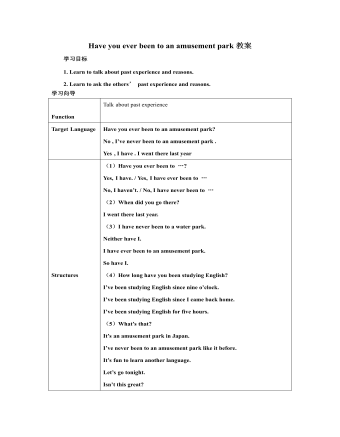
人教版新目标初中英语八年级下册Have you ever been to an amusement park教案
(1)Have you ever been to …? Yes, I have. / Yes, I have ever been to …No, I haven’t. / No, I have never been to …(2)When did you go there? I went there last year. (3)I have never been to a water park. Neither have I. I have ever been to an amusement park. So have I. (4)How long have you been studying English? I’ve been studying English since nine o’clock. I’ve been studying English since I came back home. I’ve been studying English for five hours. (5)What’s that? It’s an amusement park in Japan. I’ve never been to an amusement park like it before. It’s fun to learn another language. Let’s go tonight. Isn’t this great?space museum, amusement park, water park, South America, Peru, Holland, European culture, tour guide, flight attendant, musical instrument, more than, be from, get to, take lessons, neither, discover, graduate, change

人教版新目标初中英语八年级下册He said I was hard-working教案2篇
This activity introduces some new vocabulary and provide oral practice using the target language.Task 1 . Ask four students to stand in front of the class, and the teacher asks them the following questions as a reporter.1.What are you going to do when you grow up?2.What are you going to do next week?3.What are going to do after school?The students will give different answers, then ask a good student to report what they said.I am going to e a doctor.What did she say?----------She said she was going to be a doctor.I am going to have a party on Friday night.What did he say?-------He said he was going to have a party on Friday night.I am going to do my homework.What did she say ?------ She said she was going to do her homework.I am going home after school.What did she say?-----She said she was going home after school.Say In this unit we are going to learn to use words like to report what someone said.Task 2. Read the instructions. Then ask a student to read the four questions. And write the words on the Bb. Explain what soap opera is.Task 3. Ask the students to Look at the pictures, point out the TV screens in the picture. Ask one girl to read what Marcia said.What did Marcia say? She said She said she was having a surprise party for Lana on Friday night. Repeat the other pictures in the same way.Activity3. Listen and number the pictures in activity 1a.
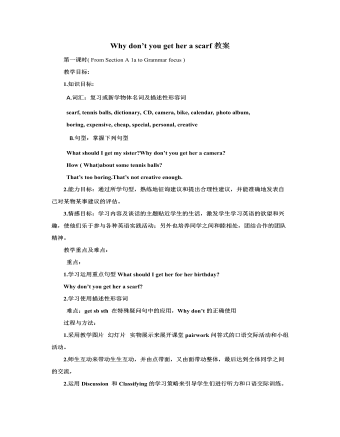
人教版新目标初中英语八年级下册Why don’t you get her a scarf教案
教师带领学生复习有关描述宠物的词汇,采用教师提问学生回答的方进行。如:T:What animals do you think would be good pets?What animals do you think would be bad pets?What do you think are good animals for a six-year-old child?然后学生进行 pairwork 练习。Task two: 师生互动,学习探究 1、播放3a部分的录音,引导学生一边听录音,一边跟读。2、通过听录音学生回答以下问题:Why do you think pot-bellied pigs are popular?What are the advantages and disadvantages of keeping such a pet?教师对学生的回答进行及时点评。3.学习范文,学习重点短语,为下步的模仿写作提供语言素材。T :1. )Have you ever kept a pig as a pet?Do you like pigs? St.:No.…Why don’t you like to keep a pig? St: No.They’re too dirty and lazy(Do you know in some foreign countries like Hollyland, Australia,pigs are the most popular pet.there’s a kind of pig.(图)it has an interesting name? it ‘s called a pot-bellied pig.) Now,let’s learn an article about this kind of interesting pet.2.)play the tapeSt.:Listen and repeat3.)show some Qs on computer(本子St.: read silently,then answerthe Qs(本子)4.)Ask ss. Close book and retell this passage.(what is a pot-bellied pig? Is it a good or bad pet? ) St.: retell it to each other“A pot –bellied pig is a popular pet now…”5.read the article together.St.:.practice reading

人教版新目标初中英语九年级下册By the time I got outside, the bus had already left教案
Ⅰ. Teaching Aims and Demands1. Knowledge Objects(1) Key Vocabularyoversleep(2) Target LanguageWhat happened?I overslept. And by the time I got up, my brother had already gotten in the shower.2. Ability Objects(1) Teach the students to use the new words.(2) Train the students to narrate past events with the Past Perfect Tense.(3) Train the students' listening and speaking skills with the target language.3. Moral ObjectIt’s a good habit to go to bed early in the evening and get up early in the morning. So you’ll never be in a hurry in the morning.Ⅱ. Teaching Key Points1. Key Vocabularyoversleep2. Target LanguageNarrate past events with the Past Perfect TenseⅢ. Teaching Difficult Points1. Train the students to narrate past events with the Past Perfect Tense.2. Train the students to understand the target language in spoken conversation.Ⅳ. Teaching Methods1. Thinking of examples from the students' real lives.2. Making sentences by looking at the pictures.Ⅴ. Teaching AidA tape recorderⅥ. Teaching ProceduresStep I Revision1. Revise the language points in Unit 8.Ask some questions like this: What volunteer work would you like to do?Help the students to answer, I’d like to…/I love to…/I hope to2. Practice the dialogue in Activity 3c on page 62 again. Get students to role play the similar dialogues with the following.

人教版新目标初中英语九年级下册Rainy days make me sad教案
1. 教材分析本单元以how do things affect you?为话题, 从颜色、天气、音乐、广告、产品等方面谈论了外界事物如何影响人的心情。要求学生掌握表达某物或某事给人带来的感觉、看法或影响等。共设计了四个部分的内容:Section A 该部分有4个模块:第一模块围绕Which restaurant would you like to go to?这一话题展开思维(1a)、听力(1b)、口语(1c)训练;第二模块围绕How does music affect you? 进行听力(2a-2b)、口语训练(2c);第三模块继续围绕how do colors in the restaurant affect you这一话题展开训练,训练形式为阅读和问题体验(3a)和小组活动(3b);第四模块仍就How do things affect you这一话题以调查的形式展开讨论。Section B该部分有4个模块:第一模块围绕产品广告对人们的影响这一话题以“配对”(1a)与“列举”(1b)两种形式展开训练;第二模块继续围绕How do things affect you? 进行听力(2a-2b)、口语对话训练(2c);第三模块围绕“Advertising”这一话题展开阅读(3a-3b)和写作(3c)训练;第四模块围绕How posters affect you这一话题以口语训练形式展开小组活动。

人教版新目标初中英语九年级下册I’ll help clean up the city parks教案
Talk about offering help (P60)I’ll help clean up the city parks.A: I’d like to work ...B: You could help ...Talk about ways to tell people about the Clean-Up Day (P61)We need to ...We can’t ...I’ll ...Talk about the work the volunteers do (P62)These three students all volunteer their time to help other people.Somebody loves to ... / helps ... / plans to ... / wants to ...A: What do you like doing?B: I like ... A: What kind of volunteer work do you think I could do?B: You could ...1. 重点词汇advertisement, fix, repair, pleasure, blind, deaf, shut, carry, specially, fetch2. 认读词汇hunger, homeless, cheer, clean-up, sign, establish, major, commitment, elementary, veterinarian, coach, similar, call-in, strategy, disabled, organization, unable, support, appreciate, donation, part of speech, pronoun, adverb, preposition, conjunction, donate, Jimmy, Sally3. 词组clean up, cheer up, give out, put off, set up, think up, take after, fix up, give away, put up, hand out, work out, at once

人教版新目标初中英语九年级下册You’re supposed to shake hands教案
教学目标:1. 掌握本单元一些重点词汇的写法和用法。2. 学会自如谈论餐桌礼仪。Step 1 RevisionAsk some students to retell the customs at the table in France in the passage in 3a.Step 2 Self checkPart 1. Fill in each bland with the correct word given. Students do the exercises by themselves at first. Then check the answers. Ask the students to comprehend the sentences and help them point out uses of some words, like “arrive (at / in) sw., spend time / money on sth , spend time / money (in) doing sth.”Part 2. Read about Fan Ling’s experience in a western restaurant. Understand the passage. Point out some key points in the passage.1. be / get used to doing sth. 习惯做某事2. begin with = start with 以….开头3. crowd v. 挤满,塞满 the crowd 人群 crowded adj. 拥挤的Then students discuss about how she would solve her problem. Ask some to share their stories with others.Part 3. Complete the crossword by looking at the sentences on the left. Then check the answers.

人教版新目标初中英语七年级下册How was your weekend教案2篇
Teaching Goal:1. General aims:Talk about recent past events2. Particular aims:A. Language Focus.Talk about recent past events and think of the past events.B. Language goalsHow was….?It was …What did …do over the weekend?C. Language structures:(1). How was your weekend? I was great. Pay attention to no form.(2). What did you do over the weekend? I played soccer. We went to the beach.D. Useful words and phrases:Words: was, did, went, beach, over, project, test, wasn’t, false, number, geography, spend, week, most, mixture, their, had, little, cook, read, saw, change, everyone, sit, sat, no, anythingPhrases: did one’s homework, played soccer, cleaned my room, went to the beach, played tennis, went to the movies, on Saturday morning, over the weekend, cook … for, what about, do some reading, have a party, talk show, go shoppingE. Grammar language:Present simple past tenseRegular and irregular verbsF. Learning strategies:Tour and holidaysG. Interdiscipinary:H. Emotion and manner:Teaching time: 5 periodsTeaching procedures:Period One教学步骤、时间 教师活动 学生活动 媒体应用Step 1Free talk 3’ Ask some questions like:Who’s on duty today?What’s the weather like? Answer and talk about something.让同学们回答下列问题1. Do you like weekend? (Let some students answer)It takes them three minutes to talk about the question.2. Why do you like weekend? (let the students answer) Most of the students like the weekend此时教师用汉语问:“在周末期间问你干了什么?这句话用英语这么回答?Let the students guess.At last the teacher give them right answer3. What did you do over the weekend?(板书、学习)